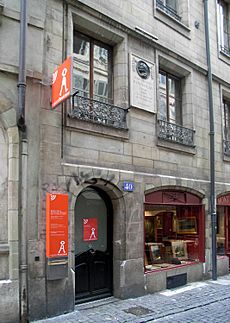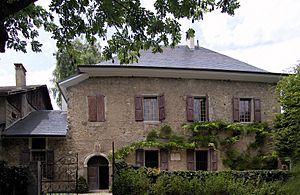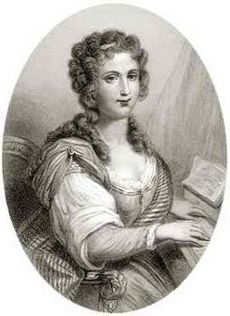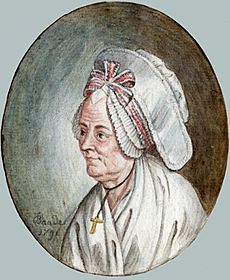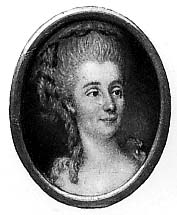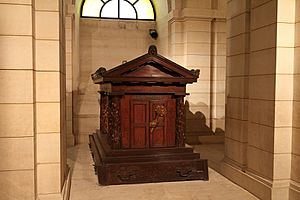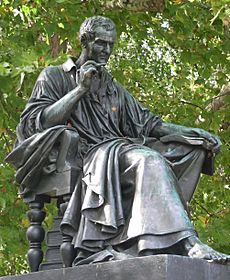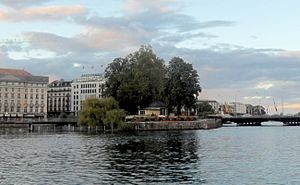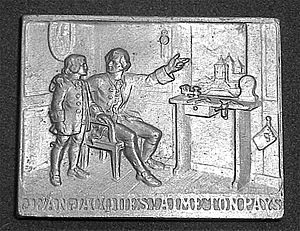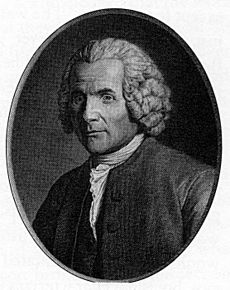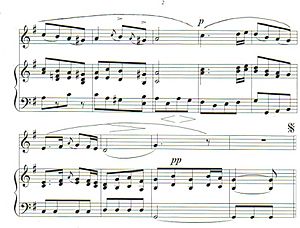Jean-Jacques Rousseau facts for kids
Quick facts for kids
Jean-Jacques Rousseau
|
|
|---|---|
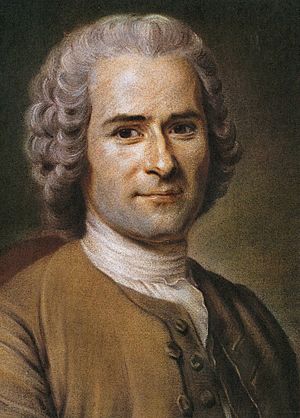
Rousseau by Maurice Quentin de La Tour, 1753
|
|
| Born | 28 June 1712 |
| Died | 2 July 1778 (aged 66) Ermenonville, France
|
| Era | 18th-century philosophy (Modern philosophy) |
| Region | Western philosophy |
| School | Social contract Romanticism |
|
Main interests
|
Political philosophy, music, education, literature, autobiography |
|
Notable ideas
|
General will, amour de soi, amour-propre, moral simplicity of humanity, child-centered learning, civil religion, popular sovereignty, positive liberty, public opinion |
| Signature | |
 |
|
Jean-Jacques Rousseau, (1712 – 2 July 1778) was a famous French speaking philosopher. He was born in Geneva, Switzerland and always described himself as being Genevan. Rousseau lived in the 18th century during the Age of Enlightenment. His political ideology influenced the French Revolution and aided the development of nationalism and socialist theories.
Rousseau was also a composer, writing numerous books about music theory. Rousseau authored Confessions, an autobiography, one of the first of its kind. Many later philosophers were influenced by him. He wrote a novel Julie, ou la nouvelle Héloïse which was a best-seller and influenced 19th century writers of romanticism.
Rousseau believed that men were born good and innocent, and that corruption and sadness happened because of life experiences and experiences in society. He believed that if society was gone, man would be happy and pure once again.
Rousseau is most famous for his social contract ideology, which is often compared to the social contract of John Locke. This ideology is stated in Rousseau's book, The Social Contract.
During the period of the French Revolution, Rousseau was the most popular of the philosophes among members of the Jacobin Club. He was interred as a national hero in the Panthéon in Paris, in 1794, 16 years after his death.
Contents
Biography
Youth
Rousseau was born in Geneva, which was at the time a city-state. Throughout his life, he generally signed his books "Jean-Jacques Rousseau, Citizen of Geneva".
Geneva, in theory, was governed "democratically" by its male voting "citizens". The citizens were a minority of the population when compared to the immigrants, referred to as "inhabitants", whose descendants were called "natives" and continued to lack suffrage. In fact, rather than being run by vote of the "citizens", the city was ruled by a small number of wealthy families that made up the "Council of Two Hundred"; these delegated their power to a 25-member executive group from among them called the "Little Council".
Rousseau's father, Isaac Rousseau, followed his grandfather, father and brothers into the watchmaking business. He also taught dance for a short period. Isaac, notwithstanding his artisan status, was well educated and a lover of music.
Rousseau's mother, Suzanne Bernard Rousseau, was from an upper-class family. Rousseau and his older brother François were brought up by their father and a paternal aunt, also named Suzanne. When Rousseau was five, his father sold the house that the family had received from his mother's relatives. While the idea was that his sons would inherit the principal when grown up and he would live off the interest in the meantime, in the end the father took most of the substantial proceeds. With the selling of the house, the Rousseau family moved out of the upper-class neighborhood and moved into an apartment house in a neighborhood of craftsmen—silversmiths, engravers, and other watchmakers.
Rousseau had no recollection of learning to read, but he remembered how when he was five or six his father encouraged his love of reading:
Every night, after supper, we read some part of a small collection of romances [adventure stories], which had been my mother's. My father's design was only to improve me in reading, and he thought these entertaining works were calculated to give me a fondness for it; but we soon found ourselves so interested in the adventures they contained, that we alternately read whole nights together and could not bear to give over until at the conclusion of a volume. Sometimes, in the morning, on hearing the swallows at our window, my father, quite ashamed of this weakness, would cry, "Come, come, let us go to bed; I am more a child than thou art." (Confessions, Book 1)
After they had finished reading the novels, they began to read a collection of ancient and modern classics left by his mother's uncle. Of these, his favorite was Plutarch's Lives of the Noble Greeks and Romans, which he would read to his father while he made watches.
When Rousseau was ten, his father, an avid hunter, got into a legal quarrel with a wealthy landowner on whose lands he had been caught trespassing. To avoid certain defeat in the courts, he moved away to Nyon in the territory of Bern, taking Rousseau's aunt Suzanne with him. He remarried, and from that point Jean-Jacques saw little of him. Jean-Jacques was left with his maternal uncle, who packed him, along with his own son, Abraham Bernard, away to board for two years with a Calvinist minister in a hamlet outside Geneva.
At age 13, Rousseau was apprenticed first to a notary and then to an engraver. At 15, he ran away from Geneva (on 14 March 1728) after returning to the city and finding the city gates locked due to the curfew.
Finding himself on his own, since his father and uncle had more or less disowned him, the teenage Rousseau supported himself for a time as a servant, secretary, and tutor, wandering in Italy (Piedmont and Savoy) and France.
Early adulthood
When Rousseau reached 20, he became a protégé of Françoise-Louise de Warens, a noblewoman of Protestant background. Rousseau idolized her and called his maman. A rather profligate spender, she had a large library and loved to entertain and listen to music. She introduced Rousseau to the world of letters and ideas. Rousseau applied himself in earnest to the study of philosophy, mathematics, and music. At 25, he came into a small inheritance from his mother and used a portion of it to repay de Warens for her financial support of him. At 27, he took a job as a tutor in Lyon.
In 1742, Rousseau moved to Paris to present the Académie des Sciences with a new system of numbered musical notation he believed would make his fortune. His system, intended to be compatible with typography, is based on a single line, displaying numbers representing intervals between notes and dots and commas indicating rhythmic values. Believing the system was impractical, the Academy rejected it, though they praised his mastery of the subject, and urged him to try again. He befriended Denis Diderot that year, connecting over the discussion of literary endeavors.
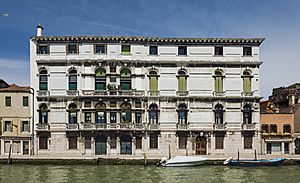
From 1743 to 1744, Rousseau had an honorable but ill-paying post as a secretary to the Comte de Montaigue, the French ambassador to Venice. This awoke in him a lifelong love for Italian music, particularly opera.
Rousseau's employer routinely received his stipend as much as a year late and paid his staff irregularly. After 11 months, Rousseau quit, taking from the experience a profound distrust of government bureaucracy.
Return to Paris
Returning to Paris, the penniless Rousseau befriended Thérèse Levasseur, a seamstress who was the sole support of her mother and numerous ne'er-do-well siblings. At first, they did not live together, though later Rousseau took Thérèse and her mother in to live with him as his servants, and himself assumed the burden of supporting her large family.
Beginning with some articles on music in 1749, Rousseau contributed numerous articles to Diderot and D'Alembert's great Encyclopédie, the most famous of which was an article on political economy written in 1755.
Rousseau continued his interest in music. He wrote both the words and music of his opera Le devin du village (The Village Soothsayer), which was performed for King Louis XV in 1752. The king was so pleased by the work that he offered Rousseau a lifelong pension. To the exasperation of his friends, Rousseau turned down the great honor, bringing him notoriety as "the man who had refused a king's pension". He also turned down several other advantageous offers, sometimes with a brusqueness bordering on truculence that gave offense and caused him problems.
Return to Geneva
On returning to Geneva in 1754, Rousseau completed his second major work, the Discourse on the Origin and Basis of Inequality Among Men (the Discourse on Inequality), which elaborated on the arguments of the Discourse on the Arts and Sciences.
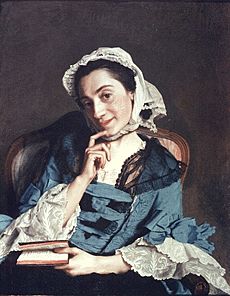
Rousseau's break with the Encyclopédistes coincided with the composition of his three major works, in all of which he emphasized his fervent belief in a spiritual origin of man's soul and the universe. During this period, Rousseau enjoyed the support and patronage of Charles II François Frédéric de Montmorency-Luxembourg and the Prince de Conti, two of the richest and most powerful nobles in France.
Rousseau's 800-page novel of sentiment, Julie, ou la nouvelle Héloïse, was published in 1761 to immense success. In 1762, Rousseau published Du Contrat Social, Principes du droit politique (in English, literally Of the Social Contract, Principles of Political Right) in April.
Rousseau published Emile, or On Education in May. In it, Rousseau advocated that all religions are equally worthy, and that people should therefore conform to the religion in which they have been brought up. This religious indifferentism caused Rousseau and his books to be banned from France and Geneva. He was condemned from the pulpit by the Archbishop of Paris, his books were burned and warrants were issued for his arrest, causing him to flee to Switzerland.
Fugitive
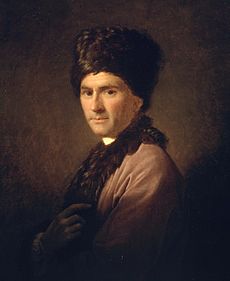
For more than two years (1762–1765) Rousseau lived at Môtiers, spending his time in reading and writing and meeting visitors. In the meantime, the local ministers had become aware of some of his blasphemous ideas and resolved not to let him stay in the vicinity. Around midnight of 6–7 September 1765, stones were thrown at the house Rousseau was staying in, and some glass windows were shattered. At this point, Rousseau's friends in Môtiers advised him to leave the town.
Since he wanted to remain in Switzerland, Rousseau decided to accept an offer to move to a tiny island, the Île de St.-Pierre, having a solitary house. Although it was within the Canton of Bern, from where he had been expelled two years previously, he was informally assured that he could move into this island house without fear of arrest, and he did so (10 September 1765). Here, despite the remoteness of his retreat, visitors sought him out as a celebrity. However, on 17 October 1765, the Senate of Bern ordered Rousseau to leave the island and all Bernese territory within fifteen days. He replied, requesting permission to extend his stay, and offered to be incarcerated in any place within their jurisdiction with only a few books in his possession and permission to walk occasionally in a garden while living at his own expense. The Senate's response was to direct Rousseau to leave the island, and all Bernese territory, within twenty-four hours. On 29 October 1765 he left the Île de St.-Pierre and moved to Strasbourg. At this point he received invitations from several parties in Europe, and soon decided to accept Hume's invitation to go to England.
Death
Rousseau died of cerebral bleeding resulting in an apoplectic stroke. He was buried on the Île des Peupliers, a tiny, wooded island in a lake at Ermenonville, which became a place of pilgrimage for his many admirers. On 11 October 1794, his remains were moved to the Panthéon, where they were placed near those of Voltaire.
Philosophy
Human nature
The first man who, having fenced in a piece of land, said 'This is mine', and found people naïve enough to believe him, that man was the true founder of civil society. From how many crimes, wars, and murders, from how many horrors and misfortunes might not any one have saved mankind, by pulling up the stakes, or filling up the ditch, and crying to his fellows: Beware of listening to this impostor; you are undone if you once forget that the fruits of the earth belong to us all, and the earth itself to nobody.
According to Rousseau, humans have two traits in common with other animals: the amour de soi, which describes the self-preservation instinct; and pitié, which is empathy for the rest of one's species. Only humans who are morally deprived would care only about their relative status to others, leading to amour-propre, or vanity. He did not believe humans to be innately superior to other species. However, human beings did have the unique ability to change their nature through free choice, instead of being confined to natural instincts.
Another aspect separating humans from other animals is the ability of perfectability, which allows humans to choose in a way that improves their condition. These improvements could be lasting, leading not only to individual, but also collective change for the better. Together with human freedom, the ability to improve makes possible the historic evolution of humanity. However, there is no guarantee that this evolution will be for the better.
Political theory
According to Rousseau, the original forms of government to emerge: monarchy, aristocracy, democracy, were all products of the differing levels of inequality in their societies. However, they would always end up with ever worse levels of inequality, until a revolution would have overthrown it and new leaders would have emerged with further extremes of injustice. Nevertheless, the human capacity for self-improvement remained. As the problems of humanity were the product of political choice, they could also be improved by a better political system.
The Social Contract outlines the basis for a legitimate political order within a framework of classical republicanism. Published in 1762, it became one of the most influential works of political philosophy in the Western tradition. It developed some of the ideas mentioned in an earlier work, the article Économie Politique (Discourse on Political Economy), featured in Diderot's Encyclopédie. In the book, Rousseau sketched the image of a new political system for regaining human freedom.
Rousseau claimed that the state of nature was a primitive condition without law or morality, which human beings left for the benefits and necessity of cooperation. As society developed, the division of labor and private property required the human race to adopt institutions of law. In the degenerate phase of society, man is prone to be in frequent competition with his fellow men while also becoming increasingly dependent on them. This double pressure threatens both his survival and his freedom.
According to Rousseau, by joining together into civil society through the social contract and abandoning their claims of natural right, individuals can both preserve themselves and remain free. This is because submission to the authority of the general will of the people as a whole guarantees individuals against being subordinated to the wills of others and also ensures that they obey themselves because they are, collectively, the authors of the law.
Although Rousseau argues that sovereignty (or the power to make the laws) should be in the hands of the people, he also makes a sharp distinction between the sovereign and the government. The government is composed of magistrates, charged with implementing and enforcing the general will. The "sovereign" is the rule of law, ideally decided on by direct democracy in an assembly.
Rousseau opposed the idea that the people should exercise sovereignty via a representative assembly (Book III, chapter XV). He approved the form of republican government of the city-state, for which Geneva provided a model—or would have done if renewed on Rousseau's principles. France could not meet Rousseau's criterion of an ideal state because it was too big.
Philosophy
Education and child rearing
Rousseau's philosophy of education concerns itself not with particular techniques of imparting information and concepts, but rather with developing the pupil's character and moral sense, so that he may learn to practice self-mastery and remain virtuous even in the unnatural and imperfect society in which he will have to live. A child should be raised in the countryside, which, Rousseau believes, is a more natural and healthy environment than the city, under the guardianship of a tutor who would guide them through various learning experiences arranged by the tutor.
Today we would call this the disciplinary method of "natural consequences". Rousseau felt that children learn right and wrong through experiencing the consequences of their acts rather than through physical punishment. The tutor would make sure that no harm results to to the child through his learning experiences.
Rousseau became an early advocate of developmentally appropriate education; his description of the stages of child development mirrors his conception of the evolution of culture. He divides childhood into stages:
- the first to the age of about 12, when children are guided by their emotions and impulses
- during the second stage, from 12 to about 16, reason starts to develop
- finally the third stage, from the age of 16 onwards, when the child develops into an adult
Rousseau recommends that the young adult learn a manual skill such as carpentry, which requires creativity and thought, will keep him out of trouble, and will supply a fallback means of making a living in the event of a change of fortune (the most illustrious aristocratic youth to have been educated this way may have been Louis XVI, whose parents had him learn the skill of locksmithing). Rousseau's ideas have influenced progressive "child-centered" education.
Composer
Rousseau was a moderately successful composer of music, who wrote seven operas as well as music in other forms, and contributed to music theory. As a composer, his music was a blend of the late Baroque style and the emergent Classical fashion, i.e. Galant, and he belongs to the same generation of transitional composers as Christoph Willibald Gluck and C. P. E. Bach. One of his more well-known works is the one-act opera The Village Soothsayer. He also composed several noted motets, some of which were sung at the Concert Spirituel in Paris.
Musical compositions
- Les Muses galantes (1743)
- Les Fetes de Remire (1745)
- Symphonie à Cors de Chasse (1751)
- Le Devin du village (1752) – opera in 1 act
- Salve Regina (1752) – antiphone
- Chansons de Bataille (1753)
- Pygmalion (1762/1770) – melodrama
- Avril – aire a poesía de Rémy Belleau
- Les Consolations des Misères de Ma Vie (1781)
- Daphnis et Chloé
- Que le jour me dure!
- Le Printemps de Vivaldi (1775)
Works
Major works
- Dissertation sur la musique moderne, 1743
- Discourse on the Arts and Sciences (Discours sur les sciences et les arts), 1750
- Narcissus, or The Self-Admirer: A Comedy, 1752
- Discourse on the Origin and Basis of Inequality Among Men (Discours sur l'origine et les fondements de l'inégalité parmi les hommes), 1754
- Letter on French Music, 1753 (Lettre sur la musique française)
- Discourse on Political Economy, 1755 (Discours sur l'économie politique)
- Letter to M. D'Alembert on Spectacles, 1758 (Lettre à D'Alembert sur les spectacles)
- Julie or The New Heloise (Julie ou la nouvelle Héloïse), 1761
- Emile or On Education (Émile ou de l'éducation), 1762 (includes "The Creed of a Savoyard Priest")
- The Social Contract, or Principles of Political Right (Du contrat social), 1762
- Four Letters to M. de Malesherbes, 1762
- Letters Written from the Mountain, 1764 (Lettres écrites de la montagne)
- Dictionary of Music. 1767 (Dictionnaire de la musique)
- Confessions of Jean-Jacques Rousseau (Les Confessions), 1770, published 1782
- Constitutional Project for Corsica, 1772
- Considerations on the Government of Poland, 1772
- Letters on the Elements of Botany
- Essay on the Origin of Languages, published 1781 (Essai sur l'origine des langues)
- Rousseau Judge of Jean-Jacques, published 1782 (Rousseau juge de Jean-Jacques)
- Reveries of the Solitary Walker, incomplete, published 1782 (Rêveries du promeneur solitaire)
Editions in English
- Basic Political Writings, trans. Donald A. Cress. Indianapolis: Hackett, 1987.
- Collected Writings, ed. Roger Masters and Christopher Kelly, Dartmouth: University Press of New England, 1990–2010, 13 vols.
- The Confessions, trans. Angela Scholar. Oxford: Oxford University Press, 2000.
- Émile or On Education, trans. with an introd. by Allan Bloom, New York: Basic Books, 1979.
- "On the Origin of Language", trans. John H. Moran. In On the Origin of Language: Two Essays. Chicago: University of Chicago Press, 1986.
- Reveries of a Solitary Walker, trans. Peter France. London: Penguin Books, 1980.
- 'The Discourses' and Other Early Political Writings, trans. Victor Gourevitch. Cambridge: Cambridge University Press, 1997.
- 'The Social Contract' and Other Later Political Writings, trans. Victor Gourevitch. Cambridge: Cambridge University Press, 1997.
- 'The Social Contract, trans. Maurice Cranston. Penguin: Penguin Classics Various Editions, 1968–2007.
- The Political writings of Jean-Jacques Rousseau, edited with introduction and notes by C.E.Vaughan, Blackwell, Oxford, 1962. (In French but the introduction and notes are in English).
- Rousseau on Women, Love, and Family, Christopher Kelly and Eve Grace (eds.), Dartmouth College Press, 2009.
Images for kids
-
Allegory of the French Revolution in honor of Rousseau, by Nicolas Henri Jeaurat de Bertry (1794). The final version of the painting was offered to the National Convention
See also
 In Spanish: Jean-Jacques Rousseau para niños
In Spanish: Jean-Jacques Rousseau para niños
- Boustrophedon
- Château de Chenonceau
- List of abolitionist forerunners
- List of political systems in France
- Rousseau Institute
- Rousseau's educational philosophy
- Schutterij – civil militia


